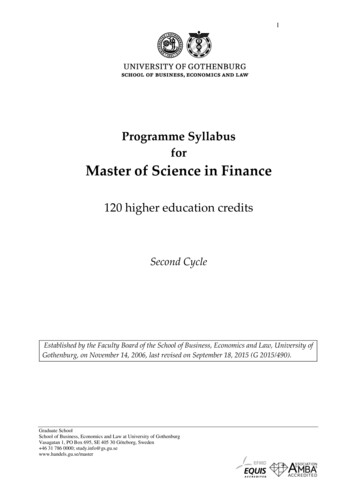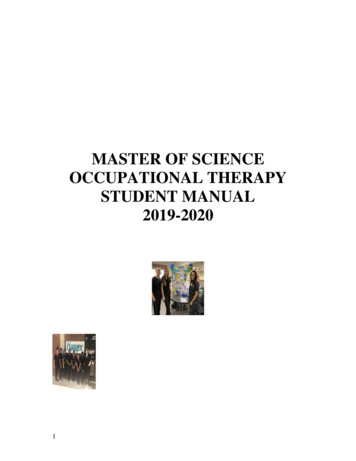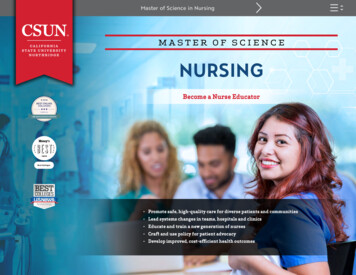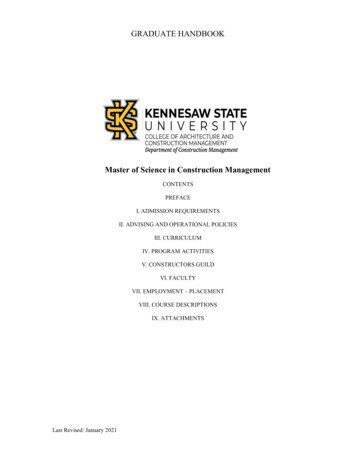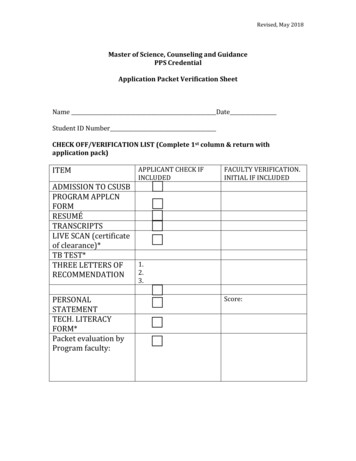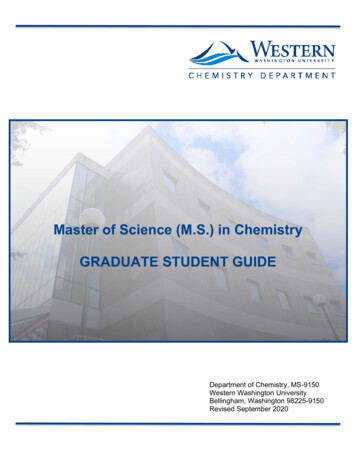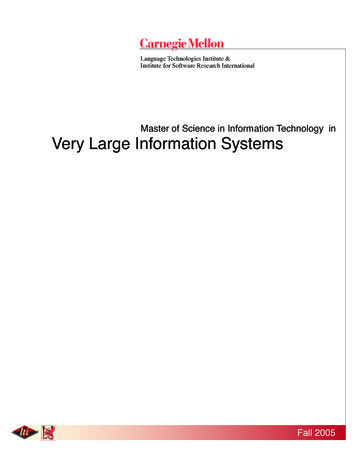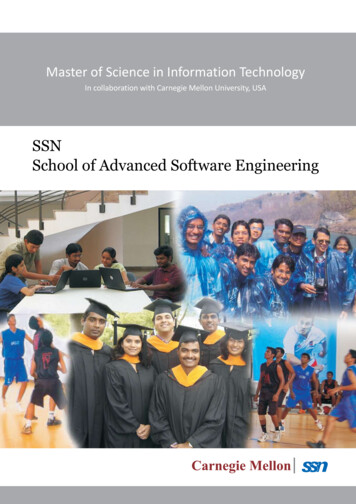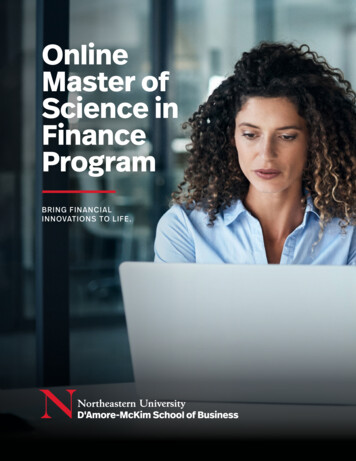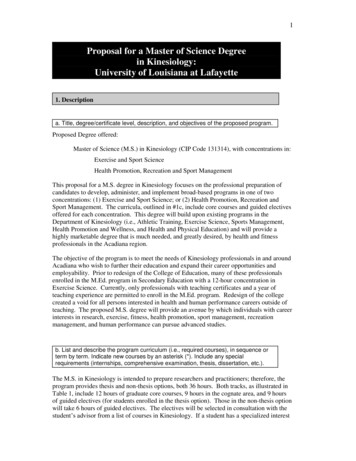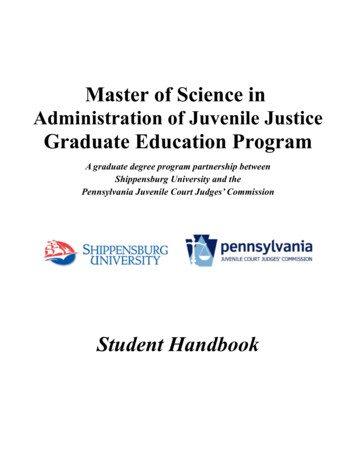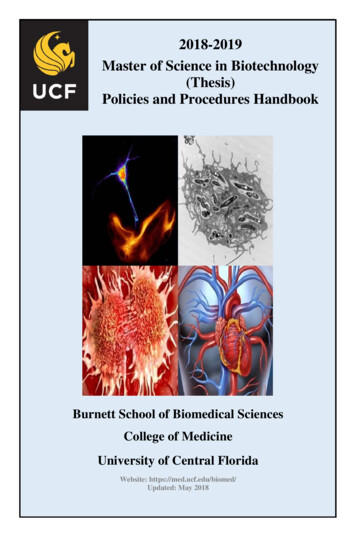
Transcription
2018-2019Master of Science in Biotechnology(Thesis)Policies and Procedures HandbookBurnett School of Biomedical SciencesCollege of MedicineUniversity of Central FloridaWebsite: https://med.ucf.edu/biomed/Updated: May 2018
Program ChecklistRequirementDateCompletedMentor selection – September 30thThesis Committee selection – by end of Fall of firstyearProgram of Study – by beginning of Spring of firstyearMet 6000 level course requirement - POSWork with your Faculty and Committee on yourThesis ProposalSchedule your Thesis Proposal/ComprehensiveExam Meeting and notify the Program Office ofyour scheduled date – by the end of Summer FirstYearEthics/Responsible Conduct of Research Workshops– Completed by the end of the first yearAnnual Review Committee Meeting – November30th of each yearYear 2Year 3Pre-Defense Meeting – must be held 1 semester priorto actual thesis defenseSubmit Pre-Defense meeting form to program officeFile Intent to Graduate on your myUCFSchedule Conference room reservations for ThesisDefense with program officeSubmit Thesis to Committee – Must be submittedtwo weeks prior to defenseSubmit Thesis Abstract for program announcementfor distribution to program office - Must besubmitted two weeks prior to defenseThesis DefenseFirst Author publicationSecond Author publicationSubmit Thesis Approval Form and PDF of finalthesis to program officeGraduate2
TABLE OF CONTENTSWelcome from the Director . . .4Program Coordinator Introduction & Welcome . 5Graduate Services Office 6Mission Statement .7Academic Integrity .8Research Divisions . . .11Program Curriculum & Requirements . . .14MS Biotechnology Thesis Programmatic Guidelines .18BSBS Spring Graduate Research Symposium .23Thesis & Thesis Defense .23Graduation Guidelines & Intent to Graduate 24Other Program Requirements . .29Fellowship and Research Assistantships .31College of Graduate Studies Research Symposium .35General Graduate Policies . .36Graduate Faculty .38MS Program Graduate Committee .40Biomedical Sciences Graduate Student Association . .41Program Facilities . .42UCF Creed . .43The Policies and Procedures of the Master of Science Program of theDepartment of Biomedical Sciences are subject to future changes approvedby the program faculty, coordinator and director. These changes may takeimmediate effect as appropriate within the students’ period of study.3
WELCOME MESSAGE FROM THE DIRECTORWelcome to the Biomedical Sciences Graduate Program at UCF!We are excited that you have chosen UCF and our Graduate Program tocontinue your training and education in Biomedical Sciences. We offer awide range of training opportunities in important areas of biomedicalresearch including Cancer Biology, Cardiovascular Disease,Neurosciences and Infectious Disease and Immunology. In the past years,the Program has grown in the numbers of both students and facultymentors. Our researchers have also experienced a rapid rise in ourfunding for impactful research projects, as well as in our reputation foroutstanding training of the next generation of Biomedical Scientists. Welook forward to having you as an important part of our Graduate StudentCommunity.Griff Parks, PhDInterim Associate Dean for ResearchDirector, Burnett School of Biomedical SciencesDirector, UCF Biomedical Sciences Graduate ProgramProfessor of MedicineUniversity of Central Florida College of Medicine6900 Lake Nona BlvdOrlando, FL 32827Office : (407) 266-7011Cell: (336) 970-1598Griffith.Parks@ucf.edu4
Program Coordinator Introduction & WelcomeWelcome to the Burnett School of Biomedical Sciences Masters of Biotechnology Program.This program is designed to give you broad knowledge and training in the scientific andpractical aspects of biotechnology. It involves innovative, hands-on and multidisciplinarylearning approaches to give you the necessary education and training in scientific aspects ofbiotechnology. The courses and research training required in this program are also designedto develop independent thinking, team work and communication skills, which are highlydesirable in the biotechnology industry.As a new master’s student, you will face many new experiences that can be both rewardingand challenging. Your studies will involve foundational coursework and laboratoryresearch. You will have the opportunity to work closely with faculty members from theBurnett School of Biomedical Sciences (BSBS) as well as other schools and colleges withinUCF and affiliated partners in the Orlando area.The Biomedical Sciences Masters of Biotechnology Program will prepare you for a careerin academic research, higher education or biotechnology. Course work will provide a basicgrounding in relevant topics, while hands-on research experience will be the cornerstone ofyour masters training. Expectations are for you to go beyond the assigned classroomreadings and use your curiosity to explore new research trends, building a knowledgebase tosupport your career as an independent scientist. Oral presentations and writing assignmentswill teach you the skills needed to effectively communicate your discoveries to the scientificcommunity.In the first year of the program you will choose an advisor and form a thesis committee thatwill guide your studies and prepare you to conduct your own research. Careful selection of asupportive advisor and appropriate thesis committee members cannot be overstated. Theprocess of achieving a masters (Thesis) degree will demand dedication and effort that go farbeyond your undergraduate experience. The expectations are high but also are theachievements and rewards.The program director, program coordinators, faculty and staff are available to help yousucceed in the program. You are encouraged to interact with your peers and to participate inthe intellectual life of the university. You have already made the decision to enter a graduatedegree program. This decision commits you to uphold the academic and ethical standardsof UCF and the discipline of Biomedical Sciences. If you have any questions or problems,please ask for advice. We are here to help.We wish you all the best of success during your graduate experience at UCF!Office 407.823.0955 Lab407.823.0950Burnett School of Biomedical SciencesBuilding 20, BMS 1364110 Libra DriveOrlando, FL directory/profile/dr-saleh-a-naser/Dr. Saleh Naser,Associate Director &Program CoordinatorEditor-in-ChiefWorld Journal of Gastroenterology5
Burnett School of Biomedical Sciences Graduate Services OfficeWelcome New Graduate Students,We are here and ready to answer all of your questions! Please read importantinformation below and let us know how we can help.The Biomedical Sciences Graduate Services Office is an integral part of ensuringyour success in the graduate program. We are heavily involved in making sureyou complete your required milestones throughout your graduate student career.Beginning with orientation, we will assist you with course registration, programof study, seminars, committees, symposiums, thesis defenses, and tracking yourachievements throughout your time in the program.Moreover, we are a critical link of communication between you and our programdirectors and coordinators, keeping all parties up to date on the latest protocolsand information for the department. We are available to assist you by phone,email or in person (by appointment).https://med.ucf.edu/biomed/Please review contact information below:Lisa VaughnSr. Admissions SpecialistProgram Emails below for your reference:Graduate Information – BSBSGradInfo@ucf.eduGraduate Registration – BSBSGradRegistration@ucf.eduShannon ConnallyAdministrative AssistantGraduate Forms – BSBSGradForms@ucf.eduGraduate Appointments – BSBSGradAppts@ucf.eduOffice Location Main Orlando Campus:Biological Sciences Building (BMS)Suite 136, 1 Floor (Ph.: 407-823-4677)stOffice Location Lake Nona Health Sciences Campus:Thursday - By Appointment OnlyBurnett Building (BBS)1 Floor – Front Desk Check in with Photo IDSTFACEBOOKLike us on duatePrograms/6
Mission Statement and Overview:Mission: The Biomedical Sciences graduate program at the University ofCentral Florida College of Medicine provides the highest qualityeducation and research opportunities for training the next generation ofbiomedical scientists.The MS Biotechnology program enriched with graduate faculty withdiverse investigative biomedical research interest and highly qualifiedstudents who are pursuing top education and cutting edge grams/ms-biotechnology/msbiotechnology-thesis/.The Graduate Faculty includes more than 80 reputable scientists withestablished achievements in diverse aspects of biomedical sciencesincluding metabolic disorders, cardiovascular sciences, infectious disease,neuroscience, cancer, nanoscience, biomedical engineering, drugdiscovery, and much more te-faculty/.Our students are recruited from outstanding programs from all over theUnited States and over 18 other countries. They are supported bycompetitive scholarships and prestigious fellowships. Our studentsreceive top tier education, rigorous training in basic and clinical research,outstanding mentoring, and lifelong professional development. Theybecome well trained in research and regulations while conductingexperiments involving the use of human subjects and animals. They learn,retain, and apply fundamental knowledge in biomedical sciences. Theygraduate from the program as scientists with excellent education, researchtraining, and focused career goals. Many go on as postdoctoral fellows,academics, scientists, and researchers.Visit: aretheynow/The curriculum of the MS Biotechnology program is continuouslyadapting to rapid changes in technology, science, ongoing research,public health, and evolving microbiome and genetic discoveries. Allstudents must successfully complete core courses with a focus onfundamental knowledge in molecular and cell biology, microbiology,biochemistry, immunology, neuroscience, bioinformatics, stem cell,metabolic, cancer, drug discovery and delivery, and more.All students are required to complete the online CollaborativeInstitutional Training Initiative (CITI), Responsible Conduct of Researchtraining and four face-to-face ethics/RCR workshops coordinated by theUCF College of Graduate Studies and the Office of Research andCommercialization. First year students are required to complete7
laboratory safety, radiation safety, biosafety, and blood borne pathogencourses. Students are also required to attend Pathways to Success seminarseries including Academic Integrity, Graduate Grantsmanship, GraduateTeaching, Personal Development, Professional Development, andResearch.The program administrators, faculty and staff are dedicated to educate,train, and mentor tomorrows scientists and future colleagues andcollaborators. Our Graduate Student Association plays the bigbrother/sister role to complements the role of our faculty to help ourstudents feel at home and succeed.Policy Statement on Academic Integrity:Integrity is a critical foundation of science and scientific training. Assuch, any incident of cheating, plagiarism, or other forms of academicmisconduct at any time by any student in the programs, may result indismissal from the program. All graduate programs organized in theBurnett School of Biomedical Sciences hold students to the higheststandards of academic conduct and scientific conduct.There are many forms of misconduct, both in academics and in science.In research, these primarily include the falsification or fabrication of dataduring one’s research project, or the plagiarism of text, figures or datafrom someone else’s work (such as a published or on-line paper). Theseexamples of misconduct, as well as other examples will be discussed inthe Practice in Biomedical Science course or other courses.In academics, the unauthorized use of electronic devices during exams, orany other means to gain an advantage during an examination will beconsidered academic misconduct. Copying another student’s work who iscurrently taking a course or previously took a course will also beconsidered academic misconduct. Both the student who supplied suchmaterial and the student who attempts to use such material are both inviolation of the standards.Many other examples of misconduct exist and common sense shoulddictate to the student what is and is not permissible. If you questionwhether an action could be considered misconduct (academic orscientific) – ask the program coordinator or BSBS director. Ignorance ofwhat constitutes misconduct is not an excuse.Disciplinary Policy:The graduate program reserves the right to carry out full disciplinaryaction against student misconduct. Any documented case of scientific oracademic misconduct is the basis for immediate dismissal from theprogram. The incident(s) will be reported to the student’s advisor, thegraduate committee, and the UCF Office of Student Conduct. After8
reviewing the case, the Director of the Biomedical Sciences Graduateprogram will have the authority to recommend dismissal of the studentfrom the graduate program.Policy Statement on enforcement of programmatic requirementsStudents who fail to complete programmatic requirements (e.g., thesisproposal defense, annual thesis committee review) by the specifieddeadlines* may be placed on academic probation. If this occurs, thestudent will be given specific written notice of the terms of the probationand will have one semester to correct the deficiency. In most cases, thestudent’s dissertation committee will be responsible for evaluating thestudent’s progress. If a thesis committee has not been formed, thenevaluation will be performed by the Program Coordinator in conjunctionwith the sponsoring PI. The evaluation body will meet with the studentand spell out the terms of the probation, and then will meet with thatstudent again within one semester to determine if the terms of theprobation have been satisfactorily met. If the deficiency is corrected, thenthe probation will be lifted. If the student fails to correct the deficiencieswithin the specified time period (1 semester), then the student will not bepermitted to register for classes or receive financial support from theprogram and may be subjected to dismissal from the program.All official communications regarding probation must include theProgram Associate Director and the Associate Dean of GraduateStudies.Grievance ProceduresIf significant issues arise between a student and their mentor that cannotbe resolved amicably, the student should first consult with the ProgramCoordinator and secondly with the Program Director to resolve the issues.If these first steps do not resolve the conflict, the student has the right torequest a dissertation committee meeting to attempt to resolve suchissues. This request for a meeting of the full committee cannot beoverruled by the Chair (Mentor) and the meeting should be chaired by adissertation committee member and not the mentor. If sought by thestudent this meeting should also include the MS Program coordinator.The program director, associate director and all coordinators should alsobe informed of the meeting and have the right to attend to help resolve theissue(s).Student Responsibility to Keep InformedIt is the student's responsibility to keep informed of all rules, regulations,and procedures required for graduate studies. Graduate programregulations will not be waived or exceptions granted because studentsplead ignorance of the regulations or claim failure of the adviser to keepthem informed.9
Changing Your E-mail, Address or Phone NumberIt is important to remember that all official university communication willbe sent to your e-mail address or physical address on file. Students areresponsible for updating their e-mail, physical address, and phonenumber. This can be done online through myUCF or by submitting awritten request to the Student Services office (see form below).Fall 2018 Academic Calendarhttp://calendar.ucf.edu/2018/fallThe Registrar’s Office manages the official Academic Calendar, whichcontains the dates and times for all registration periods, applicationdeadlines, holidays, special events, and more. You can filter the calendar,save it, or subscribe to it!10
RESEARCH DIVISIONSI.Division of Cancer ResearchResearchers in the Division of Cancer Research are on thevanguard of cancer biology, investigating: How patients’ genes play a role in their cancer risk. What causes cancer and cancer metastasis. How cancer cells communicate with the neighboring normalcells. The epigenetic changes that play a role in developing drugresistance. Discovering new ways to harness the immune system tofight cancer. Identifying new targets for companion diagnostics withtreatments that reduce side -research/II.Division of Immunity and PathogenesisThe mission of the Immunity and Pathogenesis Division iselucidation of the cellular and molecular mechanisms at theinterface of infection, inflammation and immunity. Our grouphas broad interest and expertise in microbial pathogenesis, innateimmunity, inflammatory signaling pathways and immunologicalmemory.Discoveries are being translated into innovative diagnostics,vaccines, and therapeutic strategies to improve human health.Projects are related to: Respiratory diseases (Influenza, Parainfluenza, RespiratorySyncytial Virus) Asthma and Tuberculosis Sexually transmitted diseases (Chlamydia trachomatis) Human papilloma virus and Zika virus Vector-borne diseases (Lyme disease and emerging vectorborne viruses) and inflammatory diseases (Inflammatorybowel ctious-disease/11
III.Division of Metabolic and Cardiovascular SciencesThe Metabolic and Cardiovascular Research Division focuses onunderstanding the pathogenesis, molecular mechanisms and cellsignaling of metabolic and heart diseases and to bringtranslational research into the clinical environment to serve ourcommunity.Major Areas of Research Metabolic Syndrome in Diabetes and Aging Interactions of lipids and lipoproteins in Atherosclerosis Inflammation in Cardiac Diseases (Myocardial infarction,Heart failure, Atherosclerosis) Vascular and Angiogenesis in Cardiac Diseases Biological Energy metabolism Oxidative Stress, Free Radical and Reactive oxygen species Mitochondrial Alterations Pathophysiology of CardiacDiseases Molecular and Cellular Cardiology Regenerative Medicine (Stem cells) in Heart Diseases Cardiac Genetic and Non-Genetic Disease Modeling using3D Printing Tissue Engineering and Drug Toxicity with 3D PrintedScaffolds Peripheral Arterial Diseases Developmental Biology Cardiovascular Epidemiology and Public ascular/IV.Division of NeuroscienceThe mission of the Neuroscience Division is to discover cellularand molecular mechanisms that govern normal development andfunction of the nervous system. This knowledge is then appliedto expand understanding of how neurological disorders arise andmay be treated. Current focus is on movement disorders such asParkinson's, ALS, peripheral neuropathies that damage neuronsand myelin, as well as Neurofibromatosis, a genetic disorder thatpromotes tumorigenesis in the nervous system.The division’s researchers are conducting cutting-edge researchon: Schwann cell biology and development of peripheral myelin Non-myelin
The Biomedical Sciences Masters of Biotechnology Program will prepare you for a career in academic research, higher education or biotechnology. Course work will provide a basic grounding in relevant topics, while hands-on research exp
